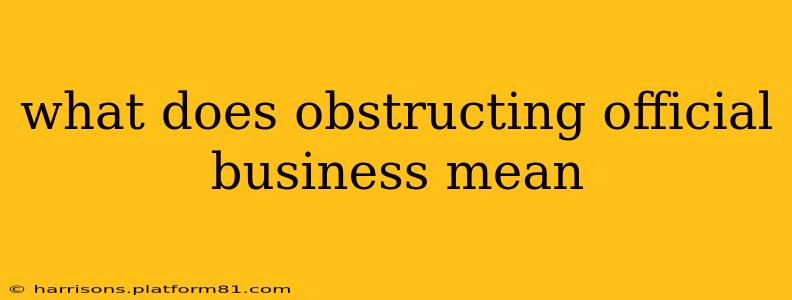Obstructing official business, also known as interfering with government operations, is a serious offense that undermines the ability of public officials to perform their duties effectively. This broad term encompasses a range of actions, from minor inconveniences to major crimes, all sharing a common thread: the deliberate impediment of legitimate governmental functions. Understanding the nuances of this crime requires examining its various aspects.
What Acts Constitute Obstructing Official Business?
The specifics of what constitutes obstructing official business vary depending on jurisdiction and the exact circumstances. However, some common actions frequently fall under this umbrella:
-
Physical Interference: This includes physically blocking access to government buildings, facilities, or personnel. For example, chaining yourself to a building entrance during a protest, or physically assaulting a police officer trying to perform their duty.
-
Verbal Harassment or Intimidation: While less direct than physical interference, persistent verbal abuse, threats, or intimidation aimed at disrupting an official's work also constitutes obstruction. This could involve shouting obscenities at a government official, making credible threats of violence, or engaging in sustained harassment through phone calls or emails.
-
Providing False Information: Deliberately misleading or providing false information to a government official, especially when it impedes an investigation or other official process, is a form of obstruction. This is a common occurrence in investigations where individuals might lie to conceal evidence or mislead authorities.
-
Withholding Evidence: Refusing to cooperate with an official investigation or actively hiding evidence that could help officials perform their duties is a clear violation. This includes destroying documents or evidence relevant to an investigation.
-
Tampering with Witnesses: Influencing or attempting to influence witnesses to provide false testimony or to withhold information from law enforcement or other government officials. This can include threats, bribery, or coercion.
-
Filing Frivolous Lawsuits: In some instances, filing repeated and baseless lawsuits against government agencies or officials, with the intention to overburden or disrupt their operations, can be viewed as obstruction.
What are the Penalties for Obstructing Official Business?
The penalties for obstructing official business vary significantly based on the severity of the offense, the jurisdiction, and the defendant's prior record. These can range from:
-
Fines: Monetary penalties are common, and the amount can vary widely depending on the circumstances.
-
Jail Time: More serious offenses, especially those involving violence or significant disruption, often result in jail sentences. The length of the sentence can range from a few months to many years.
-
Probation: In less severe cases, probation may be imposed, along with conditions such as community service or mandatory counseling.
-
Civil Penalties: Beyond criminal charges, individuals may face civil lawsuits for damages caused by their actions.
What is the Difference Between Obstructing Official Business and Other Related Crimes?
Obstructing official business is related to, but distinct from, other crimes like resisting arrest, contempt of court, and perjury. The key difference lies in the purpose of the action. Obstruction focuses on impeding the general functioning of government, while other crimes focus on specific actions or proceedings. For instance, resisting arrest focuses on opposing a lawful arrest, while obstructing official business might include actions that prevent a broader government operation, such as an investigation, even if no arrest is involved.
How Can I Avoid Obstructing Official Business?
The best way to avoid charges of obstructing official business is to cooperate with law enforcement and other government officials. This includes:
- Being truthful and providing accurate information.
- Following lawful instructions.
- Not interfering with official investigations.
- Respecting the rights and authority of public officials.
Understanding the legal definition and potential consequences of obstructing official business is crucial for anyone interacting with government agencies or law enforcement. If you are unsure about your rights or obligations in a specific situation, seeking legal counsel is strongly advised.
